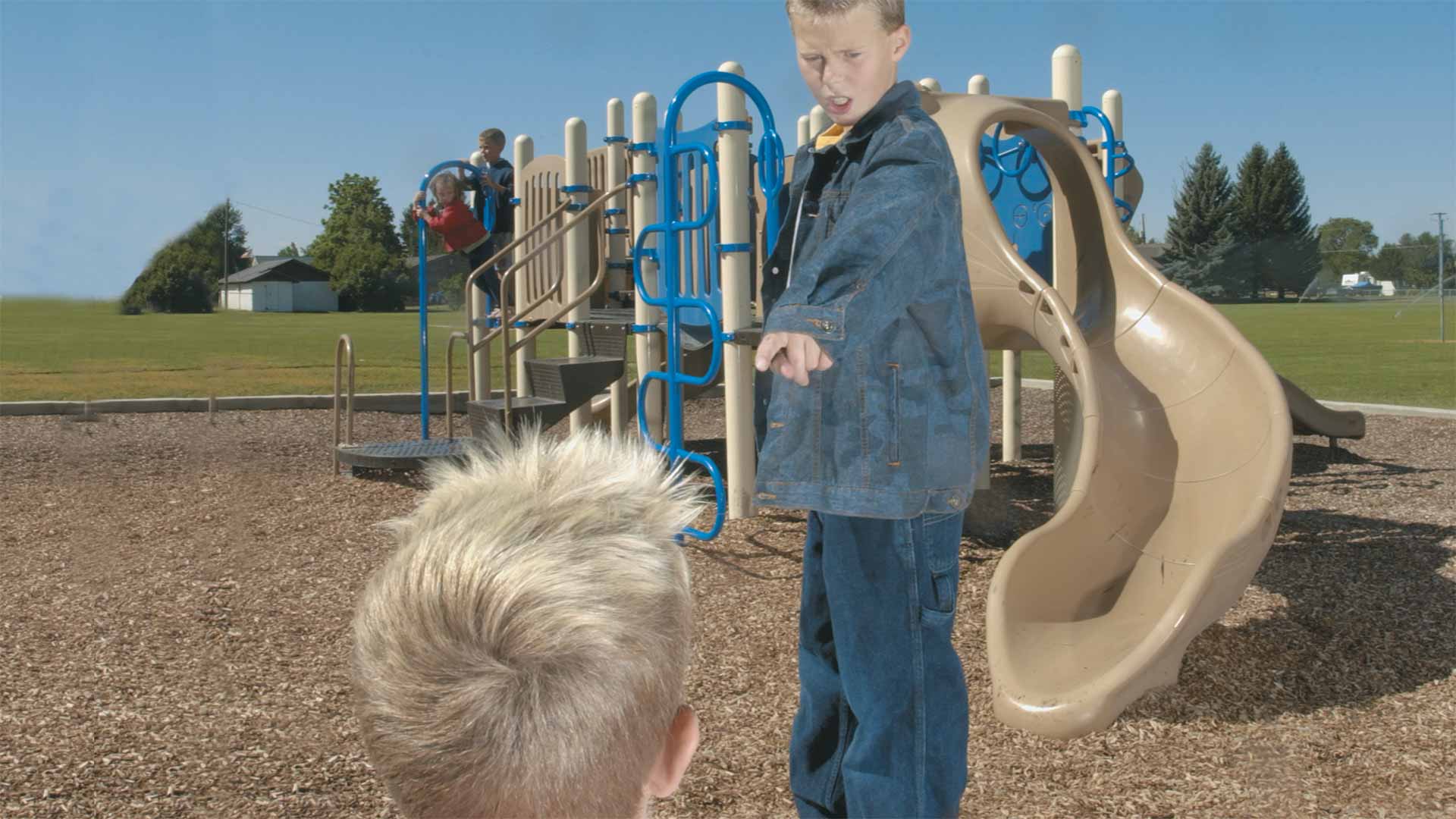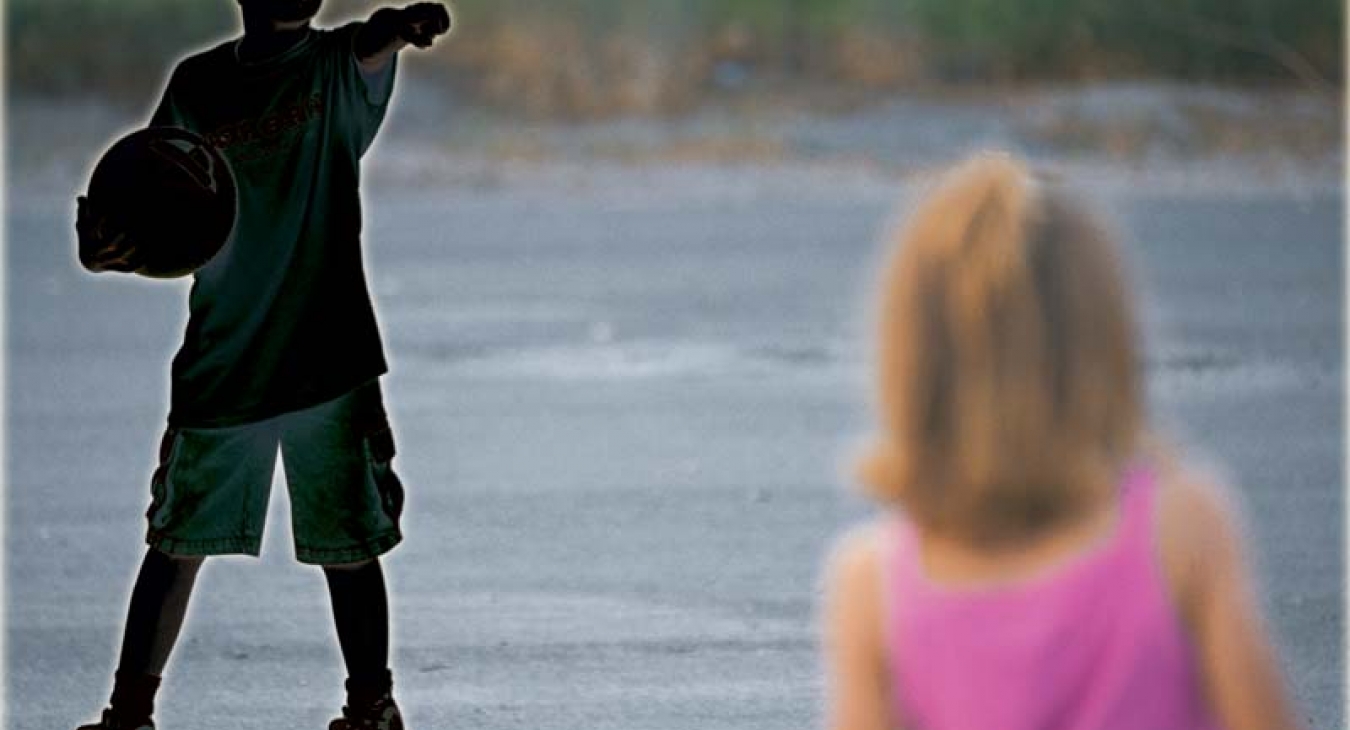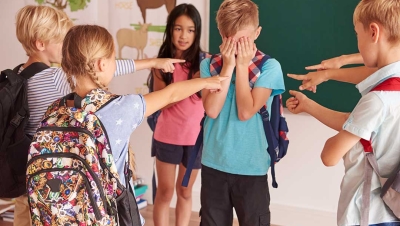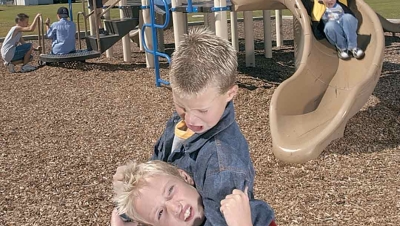Take a Stand!
Bullying, intimidation, and interpersonal conflict have been a part of playground management for generations. Children struggle with being called names, being picked on, being excluded, not knowing how to make friends, or being the ones acting unkindly or aggressively toward others. For too long, adults have believed that bullying is just part of growing up, that there have always been kids who are jocks and kids who are geeks, those who are in, and those who are out. This acceptance has prevented adults from stopping this pattern.
We know the statistics, that 15 percent of students are bullied regularly and that 80 percent of middle school children admit to bullying behavior at least once a month. What we need to recognize is that all forms of bullying are abusive. They are also opportunities to teach children how to get along, how to be considerate people, and how to be part of a community or group. The playground is part of this learning process for problem-solving, shaping behavior and coping skills, and teaching young people how to be good citizens.
When developing a playground, school, or community-based plan to address and prevent bullying, it is necessary to take into account the many forms of bullying: physical, emotional, verbal, or a combination of these. The victimizing behavior may involve one child bullying another, a group of children against a single child, or groups against other groups (gangs). Bullying is not unlike other forms of victimization and abuse in that it involves an imbalance of power, and lack of compassion and often blames the victim for what has happened.
Who are the bullies?
Probably the single most important thing to know about bullies is that they were often bullied or abused themselves. In fact, bullies are usually punished for their behavior without any recognition that they are also being victimized. Many are experiencing life situations they can’t cope with, which leave them feeling helpless and out of control. Most have poor social skills, do not fit in, and don’t meet the expectations of their families or schools. They bully to feel competent, to control someone else—in essence—to relieve their own feelings of powerlessness.
Who are the victims?
Children who are victims of bullies have many of the same characteristics as bullies. They tend to have low self-esteem, lack social skills, and don’t pick up on social cues. Additionally, they often become emotionally distraught easily and are unable to defend or stand up for themselves.
Some children actually seem to provoke their own victimization by teasing bullies, by not knowing when to stop, by egging on behavior which, in turn, victimizes them. Many children who are bullied prefer this negative attention to no attention at all.
Changing the nature of the problem
The fundamental problem with attempting to deal with bullies and victims directly when incidents or patterns of bullying occur is that those children who are bullies and those who are victims are the least able to extricate themselves from their situation. Their lack of self-esteem, social skills, and personal resources minimizes the chances of successfully affecting change. Rather, the behaviors are driven further underground.
Effective intervention must include whole-school bullying policies, increased supervision, and intervention at the time the problem is occurring, additional intervention with individual bullies, and specific instruction for all children in the areas of conflict resolution, assertiveness, and advocacy.
Preventing Bullying
A comprehensive approach to changing the incidences of bullying involves several steps:
- Recognize that bullying occurs in social contexts (playgrounds, school hallways, neighborhoods) in which teachers and parents are generally unaware of the extent of the problem and other children don’t want to be involved or don’t know how to help. Consider the playground the ideal place to change the patterns of unkind and inappropriate social interactions among children. Teachers, parents, and playground attendants should stop saying things like “you guys work it out” to children who have no skills to work it out. Each adult in this situation has a “teachable moment” that should not be squandered.
- Teach young people that all forms of bullying are unacceptable. This sets a standard for their own behavior and lays the foundation for prevention of physical, emotional and verbal abuse by adults. Children who are emotionally and physically abused by adults are most likely to continue that pattern as children and when they themselves become adults.
- Recognize that the real power lies with the children who are neither bullies nor victims. These young people have the best social skills, the highest self-esteem and are those most likely to be emulated. Teaching this group that bullying is unacceptable and giving them the skills to intervene immediately, effectively and consistently is where we most dramatically reduce the levels of bullying in this culture.
- Teach prevention skills from preschool through adulthood. As soon as preschool children begin to interact with others, we can teach them not to be bullies and not to be bullied. We can give them words for their feelings, limit and change their behavior, and teach them better ways to express their feelings and wishes. Children do not learn to solve these kinds of problems and get along by themselves. We need to teach them.
Concrete examples
- In preschool, children resort to physical power to get what they want. This is when we begin to teach them how to share, to use their words, and that physical aggression is unacceptable. The simple words, “we don’t hit,” and “use your words,” lay the groundwork for the prevention of bullying.
- In kindergarten, children learn the power of exclusion. We begin to hear things like, “she’s not my friend and she can’t come to my party.” Respond with, “you don’t have to be friends with her today, but it’s not all right to make her feel bad by telling her she can’t come to your party.”
- hysical aggression on the playground should be observed. If the bullied child acquiesces or walks away, the playground monitor should intervene saying, “You don’t have to put up with that. Let’s go get your ball back and see if everyone can play together.”
- In the early elementary grades, cliques and little groups develop, which can be quite exclusionary and cruel. Children need to hear clearly from us, “It’s not all right to treat other people this way. How do you think she feels being told she can’t play with you?” Kids don’t have to play with everyone or even like everyone, but they can’t be cruel about excluding others.
- Boys who are physically small or weak are more prone to victimization. The message to the larger group needs to be crystal clear. “This is not okay. Think about how he must feel. How could you include him and let other kids know it’s not all right to treat others this way?”
- Role-play: Children learn by doing. Acting out situations, in a structured environment, is what makes prevention of bullying and interpersonal conflict skills real for children. The process of teaching is one of discussion first and then role-play, applying the concepts to real situations and learning how to implement the concepts with skill.
- Children who are not bullies or victims have a powerful role to play in shaping the behavior of other children. Teach children to speak up on behalf of children being bullied. Through role-play the adult can practice with them to say “Don’t treat her that way, it’s not nice.” “Hitting is not a good way to solve problems; let’s find a teacher and talk about what happened.”
Bullying is not an inevitable part of schools or playgrounds. Children take their lead and learn from what we do and from what we don’t do. A proactive approach to interpersonal conflict on the playground will effectively and dramatically reduce the amount of bullying and interpersonal conflict not only on the playground but in the classroom and the community as well. It is the level of adult intervention and support that enables free play time to be successful.
Dr. Sherryll Kraizer is the executive director of the Coalition for Children, an internationally recognized leader in the development and evaluation of prevention programs. She is the author of the “Take A Stand Program for the Prevention of Bullying” program, a program that features all the key components that have been identified as essential to a comprehensive prevention program.
For more information on Dr. Kraizer or the Take A Stand Program, visit www.safechild.org or call (303) 320-6321.
Playgrounds Aren't the Only Place Bullying Occurs
Stopping Cyberbullying
In this digital age, cyberbullying has more variations than ever. From text messages to social media posts and emails, many cyberbullies never have to see the impact their words have on their victims. The digital nature of these attacks makes it easier to write these hurtful insults since they are not said to the person’s face.
The online nature of these attacks also affects the victim in different ways – it is harder to punish someone for the attacks when they do not know who the person is. Cyberbullying attacks can also be more embarrassing for the victim since it’s hard to delete public online attacks and everyone can read and reread as much as they like.
Over 25% of teens and adolescents have been bullied repeatedly through their cell phones or the internet. This growing statistic makes knowing how to spot or help someone being cyberbullied more important than ever. Whether it's knowing how to report an incident or knowing how you can prevent a cyberbullying attack, simple strategies can make a big difference.
Bullying is not an inevitable part of schools or playgrounds. Children take their lead and learn from what we do and from what we don’t do. A proactive approach to interpersonal conflict on the playground will effectively and dramatically reduce the amount of bullying and interpersonal conflict not only on the playground but in the classroom and the community as well. It is the level of adult intervention and support that enables free play time to be successful.
References:
- Olweus, D. (1993). Bullying at school: What we know and what we can do. Cambridge, MA: Blackwell. ED 384 437.
- Espelage, Univ of Illinois @ Urbana-Champaign, 1999.
- Paulk & Swearer, Univ of Nebraska @ Lincoln, 1999.
- Charach, A., Pepler, D., & Ziegler, S. (1995). Bullying at school—a Canadian perspective: A survey of problems and suggestions for intervention. Education Canada, 35(1), 12-18. EJ 502 058.






Add new comment